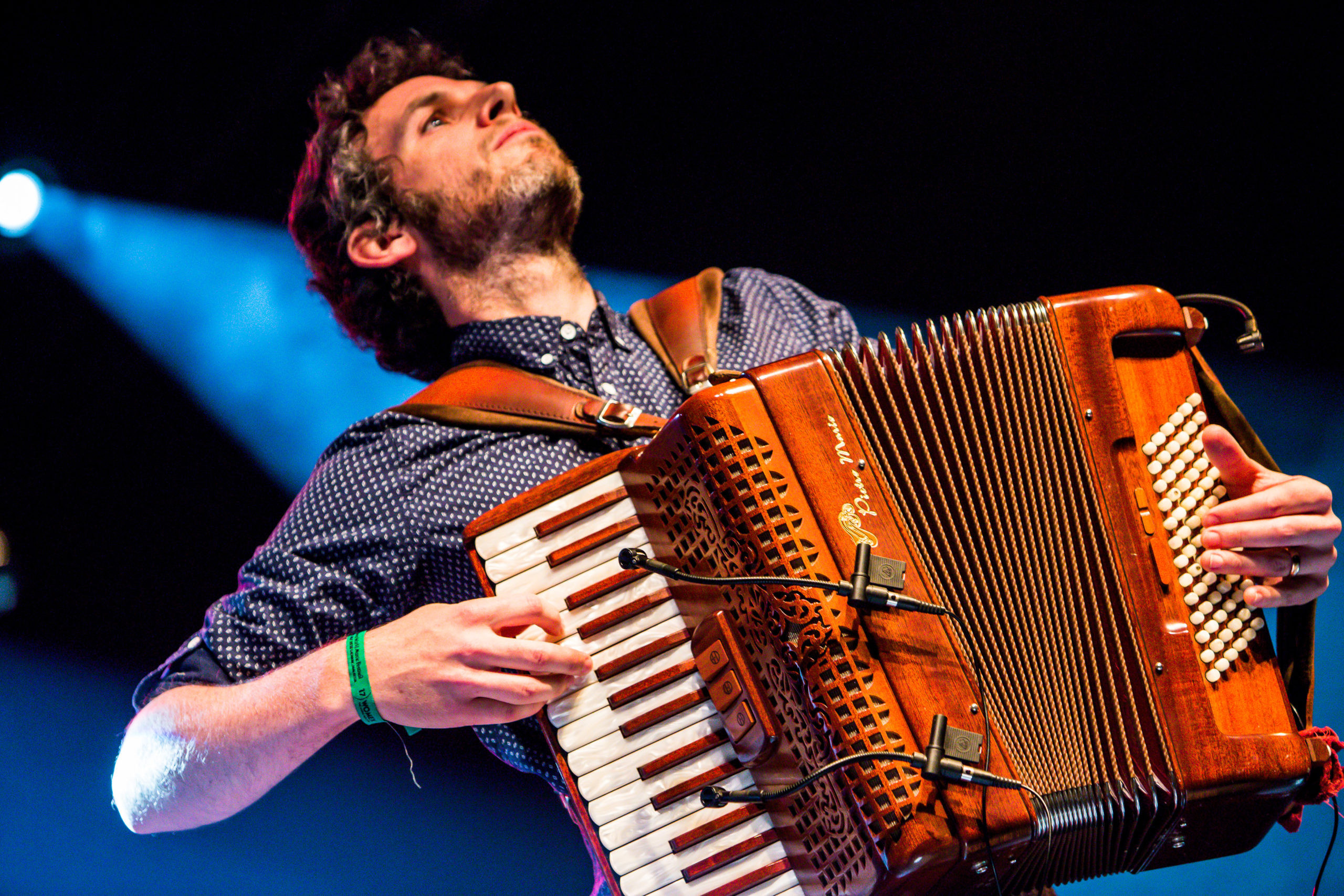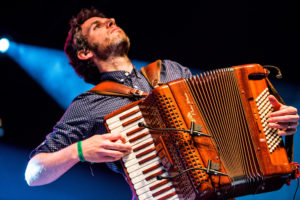ALAW, Dead Man’s Dance (Dawns y Gŵr Marw).
Though they both are proud of the fact that they are roots infused, the water is deep between the kinds of music that Rootstime deals with, and the music that can be branded as ‘folk’. Of course, this all too short analysis is a bit simplistic. Of course there are tangential points between genres, there are breaches in the wall and there are inevitably cross-overs, and so forth, but it’s safe to say that essentially it is the blues (blue notes, syncopation…) that is standing between folk and that what we tend to call ‘roots music’. Despite this, there is actually thoroughbred folk that is at the same time, without betraying tradition, conceptually so strong that any fan of roots music with some sense of adventure can enjoy. The urge to evolve, albeit internally and with caution and respect, is a strong incentive for this.
Over the course of the last year we can attribute this quality to the live recording of The Gloaming, ‘Live At The NCH’. This Irish-American band obviously doesn’t make it easy for a roots fan, but the reward is double or triple. The Gloaming serves Irish music of a blood chilling superior instrumental and vocal quality. Nevertheless, at the same time they transgress tradition, thanks to the idiosyncratic piano accents by (nowadays) New Yorker Thomas Bartlett alias Doveman. In 2018 we were just as enthusiastic about the sophomore record by Olivia Chaney, ‘Shelter’. It confirms all the good we were able to ascertain concerning ‘The Longest River’ (2015) You can easily call Chaney a folk singer-songwriter, in line with what, for instance, Karine Polwart from Scotland does, for many a year already. Polwart confirmed this with the release of ‘Laws Of Motion’, this year. Olivia Chaney is a busy bee, who greatly contributed to the magnificent ‘Folk Songs’ of the Kronos Quartet (just as Rhiannon Giddens, Natalie Merchant and Sam Amidon did) and to the Offa Rex project, ‘The Queen Of Hearts’, where she is flanked by The Decemberists (both albums stem from 2017)
Another fierce lady is Scottish singer and multi-instrumentalist Julie Fowlis, who in the course of time linked her name to an array of interesting projects. She also stands for quality. That’s proven once more with her fifth solo album ‘Alterum’, arguably the best that appeared this year in this style, together with Chaney’s ‘Shelter’, though we must admit our knowledge in the field is rather limited. There’s also the ironclad ‘Between The Earth And Sky’ by Lankum, follow up to the distinguished ‘Cold Old Fire’ (2014) Originally they called themselves Lynched but that name conjured up too many associations with racist violence. So they rebaptized themselves Lankum, after the old Irish ballad ‘False Lankum’, that deals with an infamous… child murderer. That fact doesn’t say anything about the music, luckily. Anyway, these CD’s show that ‘tradition’ doesn’t equal ‘boredom’. They all merit attention and listening ears, but here and now we want to present Welsh folk trio Alaw.
If you were there at Brosella Folk 2018, Saturday July 7th in the Groentheater (Green Theatre) at the foot of the Atomium in Brussels, then you can surely testify: even among the surprisingly strong acts in the festival this threesome from Wales stood out: together Dylan Fowler (guitar, piano, mandocello, lap steel…), Jamie Smith (vocals, accordion) and Oliver Wilson-Dickson (vocals, violin) form Alaw, as a band still young, but the members have gathered a substantial mileage in folk music, sometimes teaming up together in Jamie Smith’s Mabon. But we know Fowler is also as the guitar player of no less than Julie Murphy and as the leading force behind Fernhill. Oliver Wilson-Dickson also has a busy calendar with storyteller Daniel Morden, as a duo or as members of The Devil’s Violin. You can find Oliver with accordion player Luke Carver Goss doing sessions and workshops with children and with demented people. He is also a collaborator with BBC 4 and Welsh TV.
Welsh tradition is the beating heart of Alaw, staying close to the originals or refurbishing them, always with infectious passion. ‘Dead Man’s Dance (Dawns y Gŵr Marw)‘ (named after the opening ‘Dawn’s Soig – Dawns y Gŵr Marw’, a dance tune out of Alawon John Thomas’ ‘A Fiddler’s Tune Book From The Eighteenth-Century Wales’) is the cussessor of debute ‘Melody’ (‘alaw’ means melody in Welsh!) On the first one Alaw kept to traditional pieces. On the new one Alaw goed broader. They get assistance solely from singers Georgia Ruth and Gwilym Bowen Rhys, but they represent the top of Welsh folk singing. Ruth for instance truely excels in the soberly arranged ‘Y G’lomen’. Everything Alaw does on ‘Dead Man’s Dance’ bears witness of a scarcely believable precision and skill, a delicate subtlety and an overwhelming enthusiasm as at Brosella. Especially remarkable is the interweaving of the inherited material with the new songs or reworkings.
The self-written pieces (in English) by Oliver blend perfectly with the traditional, that clearly has been selected carefully. The closing ‘When It’s Gone’ by Oliver Wilson-Dickson must be one of the most touching ballads of 2018, though the instrumental ‘Iâr Fach yr haf’ of Dylan Fowler is gifted with an equally divine ‘old’ melody. Brilliant example of this careful merging is the reworking in Welsh of the sea shanty ‘Santiana’ of John Glyn Davies (1870-1953) It’s a song with a powerful drive, folk without rock, but with a comparable intensity. ‘Dead Man’s Dance (Dawns y Gŵr Marw)‘ by Alaw is an exploration through a less illustrated side of the traditional music of the British isles with three experienced guides. At the same time it offers a view on the future of ‘The Land of Song’. It is as significant as the records we mentioned at the start.
Antoine Légat (Flemish/Dutch original for www.rootstime.be: November 3rd – this translation: November 21st 2018)

